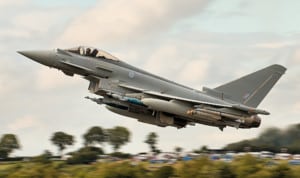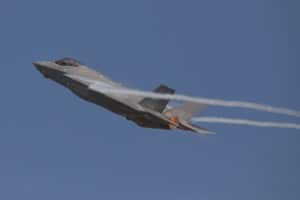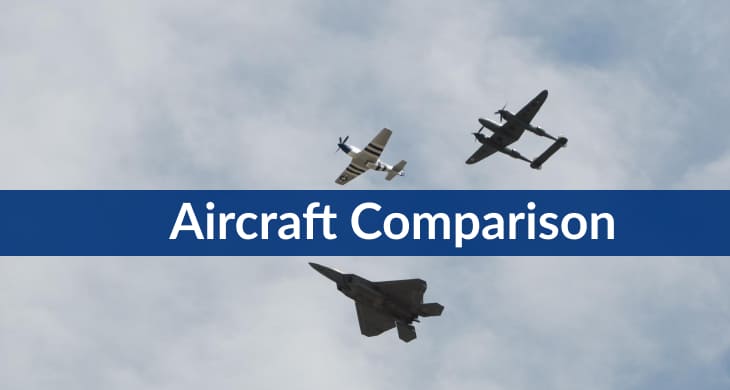During the Cold War, European nations sought out a means of checking the Soviet Union’s ever-present threat of war. Meanwhile, across the Pacific, the US looked to replace its aging fleet of aircraft with a multi-role aircraft. They found their answers in the Eurofighter and F-35 respectively.
| Aircraft: | Eurofighter Typhoon T1 | Lockheed Martin F-35 Lightning II |
|---|---|---|
| Photo: |
 |
 |
| Country: | Germany | United States |
| Manufactured: | from: 2003 to: Present | from: 2011 to: Present |
| ICAO: | - | F35 |
| Price: | $90 million | $115.5 million |
| Avionics: | BAE Systems Tranche 2 avionics | JSF Cooperative Avionics |
| Engine: | 2x Eurojet EJ200 afterburning turbofan | 1x Pratt & Whitney F135-PW-100 |
| Engine Type: | Turbofan | Turbofan |
| Power: | 13,500 pound-force | 43,000 pound-force |
| Max Cruise Speed: |
1147 knots 2,124 Km/h |
1043 knots 1,932 Km/h |
| Approach Speed (Vref): | - | 250 knots |
| Travel Range: |
2,047 Nautical Miles
3,791 Kilometers |
1,500 Nautical Miles
2,778 Kilometers |
| Fuel Economy: | - |
0.94 nautical mile / gallon 0.460 kilometres / litre |
| Service Ceiling: | 65,000 feet | 65,000 feet |
| Rate of Climb: |
62600 feet / minute 318.01metre / second |
40000 feet / minute 203.20metre / second |
| Take Off Distance: |
91 metre 298.55 feet |
168 metre 551.17 feet |
| Landing Distance: |
213 metre 698.81 feet |
213 metre 698.81 feet |
| Max Take Off Weight: |
23,500 Kg 51,808 lbs |
31,751 Kg 69,998 lbs |
| Max Landing Weight: | - | - |
| Max Payload: |
6,486 Kg 14,299 lbs |
8,160 Kg 17,990 lbs |
| Fuel Tank Capacity: |
1,642 gallon 6,216 litre |
2,760 gallon 10,448 litre |
| Baggage Volume: | - | - |
| Seats - Economy: | 2 seats | 1 seats |
| Seats - Business Class: | - | - |
| Seats - First Class: | - | - |
| Cabin Height: | - | - |
| Cabin Width: | - | - |
| Cabin Length: | - | - |
| Exterior Length: |
4.71 metre 15.45 feet |
15.7 metre 51.51 feet |
| Tail Height: | - | 4.48 metre - 14.70 feet |
| Fuselage Diameter: | - | - |
| Wing Span / Rotor Diameter: |
5.28 metre 17.32 feet |
10.7 metre 35.10 feet |
| Wing Tips: | No Winglets | No Winglets |
| More Info: | Eurofighter Typhoon T1 | Lockheed Martin F-35 Lightning II |
|
Data presented is for entertainment purposes and should not be used operationally.
|
Other Eurofighter Typhoon T1 comparisons:
- Eurofighter Typhoon vs Sukhoi Su-57 Felon
- Eurofighter Typhoon vs Sukhoi Su-35
- Eurofighter Typhoon vs MiG 29
- Eurofighter Typhoon vs Saab Gripen
- Eurofighter Typhoon vs Dassault Rafale
- Eurofighter Typhoon vs F-16 Fighting Falcon
- Eurofighter Typhoon vs F-22 Raptor
- Eurofighter Typhoon vs McDonnell Douglas F-15 Eagle
- Eurofighter Typhoon vs Boeing F/A-18 Super Hornet
Other Lockheed Martin F-35 Lightning II comparisons:
We have more variants of each aircraft in our database. On the compare aircraft page you can compare any two aircraft yourself.
The Eurofighter Typhoon
In the theater of war, each party strives to have the upper hand over their enemies and this has held for centuries. During the 1980s, faced by an increasingly sophisticated armed neighbor, European nations came together and financed research and development of the Eurofighter to create the best European fighter jet.
Thanks to its beyond visual range capabilities, this delta-winged warplane possesses dog fight and surface attack capabilities. It has supercruise features, i.e., it can fly at speeds over Mach one without engaging the afterburner.
Currently, the plane serves as NATO’s European air defense backbone. Additionally, it helps provide cover to the South Atlantic, United Kingdom, and the Middle East.
The F-35 Lightning II
As a 5th generation fighter, this multi-role aircraft combines advanced stealth technology with speed and agility to ensure US dominance in air and land operations. The F-35 Lighting II is meant to replace most US fighters (A-10, F-16, F/A-18, and AV-8B) across all the military branches.
The jet features electronic warfare as well as reconnaissance, surveillance, and intelligence capabilities. Maintaining air superiority is essential in the preservation of global security. The F-35 is designed to counter current and foreseeable threats to this stability.
Differences Between Typhoon and F-35
As impressive as both aircraft are, they are different in some ways. First, there is a slight difference in price between the two.
Despite costing more than the F-35, the Eurofighter is affordable to fly and maintain. However, the Eurofighter is more nimble and agile compared to its competitor. Despite this, thanks to its advanced avionics and stealth capacity, the F-35 has the first look-first shoot-first kill advantage.
Similarities Between Typhoon and F-35
In terms of similarities, other than being manned by a 1-man crew- the two are quite different. Indeed, both of these planes were conceived to fill various roles. Despite this, they are equally lethal.
What’s Better About The F-35
Stealth
What is stealth? By no means am I referring to “star-wars” or “Avenger” kind of stealth- that’s years ahead. By employing a mix of design, technology, and tactics, the F-35 can elude or mix enemy capabilities of locating and destroying the craft.
Through basic designs such as having an internal fuel and weapons bay, embedded mission sensors, external shape, etc., the lightning II can achieve unprecedented stealth permeance.
Weapon Capacity
At 29,002 lb. when empty and 70,107 lb. mission ready, the F-35 is more than capable of housing a wide range of bombs and missiles internally. Depending on the mission environment, there’s the option of carrying up to eight StormBreaker weapons externally on its wings.
The 6th Sense
Sensor fusion allows this stealth warcraft to scan heat signatures from other aircraft, analyze it then decide the threat level- all while being miles away. If the onboard computer determines there’s a threat, it communicates to other F-35’s nearby. Pilots and ground crews have heightened situational awareness.
The jets never hunt alone, always as a pack. In no scenario can an enemy manage to sneak on any single aircraft. This means fewer jets are needed to cover vast amounts of airspace.
Nuclear Armament
Currently, of the two, the F-35 is the only plane certified to carry US B61 nuclear bombs during a crisis as part of NATO’s nuclear strike. This gives it an edge over the Eurofighter (at least until the Pentagon certifies it).
What’s Better About the Eurofighter Typhoon
The Eurofighter delivers an enviable level of maneuverability and efficiency. The aircraft is designed with the possibility of future upgrades and capabilities in mind. It excels against the F-35 in these areas:
Speed
The jet features twin EJ200 power plants, each capable of producing a staggering 90Kn of thrust. This means that the typhoon can reach speeds up to twice that of sound, with a top speed of Mach 2. It can attain a speed of 1,100mph slightly under 3 minutes after take-off- you blink and miss it.
Maneuverability
Did you know that the plane is highly unstable and was intentionally designed that way? To some, this is a great disadvantage, but it makes the plane highly agile and maneuverable.
Furthermore, this reduces drag while increasing lift at subsonic speeds, making the aircraft suitable for short take-offs and landing (ideal for aircraft carriers). At 64,993 ft, the Eurofighter enjoys a higher cruising ceiling and a broader range of 1,802 miles than the F-35’s 1,379 miles.
Lower Costs
Despite costing more per unit compared to the F-35 ($106 million/$94 million), the Eurofighter is way cheaper to operate and maintain in the long run. It also consumes lower amounts of fuel and is more dominant in any dog fight.
Conclusion
The F-35 program is marred in controversy. It’s the most expensive US defense project, expected to cost more than $1 trillion over its 60-year lifespan. Advocates for the project promise that it will be a game-changer, but that is yet to be seen.
The Eurofighter made its combat debut over Libyan deserts in 2011 with the UK’s Royal Air Force. It’s faster, cheaper to operate, carries an impressive payload, and can be upgraded to meet future battle needs.
Nevertheless, the nature of air warfare is dynamic and currently, the future lies more on stealth than speed. Consequently, the F-35 is more suited to match and outperform the Eurofighter in such a scenario.

